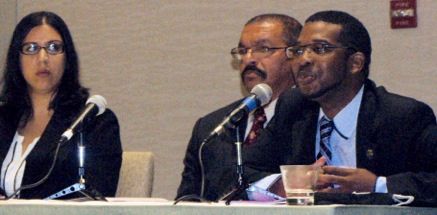By McKenzie Jackson/California Black Media
Over 500 educators, parents, and stakeholders attended the annual California Association of African-American Superintendents and Administrators (CAAASA) last week in San Diego. The conference aims to convene education experts and stakeholders to help better understand best strategies for African American and other underserved students.
African-American, Hispanic, and low-income or low-language students are assets that must be invested in, said Dr. Kent Paredes Scribner, a commissioner with the White House Initiative on Educational Excellence for Hispanics.
“They are not problems to be solved,” he said. “It is good for the California economy to invest in this beautiful human resource of young people. They grow up to be adults so we ought to invest in them today.”
Scribner opened the first session and told an audience of over 200 educators and education advocates that U.S. Secretary of Education Arne Duncan believes the achievement gap between minority and non-minority students is the greatest civil rights issue of today.
 “If we are going to have an economy that is vibrant and effective we must invest in the resources we have,” said Scribner, who is also a superintendent with the Phoenix Union School District in Arizona.
“If we are going to have an economy that is vibrant and effective we must invest in the resources we have,” said Scribner, who is also a superintendent with the Phoenix Union School District in Arizona.
Scribner was one of four speakers to take the stage in San Diego as a part of the summit’s opening discussion, which centered on “Accelerating Academic Growth for African American and Other Students of Color.”
The other speakers were Dr. Randy Ward, a superintendent with the San Diego County Office of Education, Dr. Rita Kholi, an assistant professor at the University of California-Riverside, and Corey Jackson, the mentoring chair of the 100 Black Men Inland Empire.
The four are among the over 50 speakers and specialists that presented during the three-day conference, which is geared towards furthering CAAASA’s goal of identifying and addressing critical issues in education through public policy relative to the status and performance of African-American students in the classroom.
In attendance at the event were school superintendents, administrators, teachers, parents, and business partners from across the Golden State.
During the summit attendees took part in workshops, discussion groups, and talks that focus on issues attached to educating black and other minority youths in California including President Barack Obama’s “My Brother’s Keeper” program, community and family health, school truancy, college readiness, and parent engagement.
In her opening remarks, CAAASA President Dr. Judy White said the 500-member CAAASA is declaring the mantra “Persevere until its here.”
“What? Equity. Where? Every educational institution? When? Now,” she said. “Persevering is not a long race. It is many short races, one after another. This summit is one of those short races.”
Dr. Randy Ward, a superintendent with the San Diego County Office of Education, said far too many African-American students are not achieving academic success like white or Asian students.
“We talk about the achievement gap, but what about the opportunity gap,” he said? “Many kids don’t have the opportunities others do.”
Ward said African-American students need access to the same tools as other students to excel such books with a rich vocabulary, high-quality teachers, technology for educational means, and high expectations from their family and teachers.
“The same thing you expect from one child, you expect from another,” he said. “Our children do not need pity, they need an education.”
During a question and answer session with the panelists, Jackson said African-American students will show respect when given respect.
“When they believe you care about them, when they know you are willing to sacrifice for them,” he said. “Then, they are going to accept your high expectations.”
Ward concluded that students need to have a plan to reach those expectations.
“You have to show them what the filters are to get to that plan,” he said. “Its individual responsibility for students to pick the path, but they have to be shown the path first. That is our responsibility as adults.”
Dwight Bonds, CAAASA’s executive director, said he hopes the summit’s attendees can take what they learn during at the event back to their schools and students.
“We are going to be that much more prepared to work and serve students of color.”
 Westside Story Newspaper – Online The News of The Empire – Sharing the Quest for Excellence
Westside Story Newspaper – Online The News of The Empire – Sharing the Quest for Excellence



